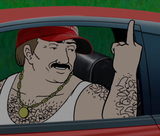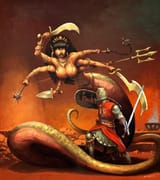>>3834285
Everyone here who was actually alive in those days immediately recognizes that you were not. Tabletop games were the refuge of outcasts, dorks, freaks and geeks. It literally was a safe space before the concept of "safe space" existed. Autism wasn't even really understood in those days. There wasn't a concept of "transgender", they were just gay. You didn't "enjoy" games, you played them. No one was gatekeeping, because no one had to: to be associated with games was to be profoundly uncool. No one admitted they played games to anyone who didn't also admit they played games. It was a secret shameful thing that got you stuffed in lockers and trashcans at school.
There was no dumbing down. That's not what happened. Instead, what happened is that games became more socially acceptable - and thus more profitable. And thus there became a desire to make them a more formal experience, with rules that weren't just Mother May I and Calvinball. The concept of "game design" began to emerge, and the notion that you could critique and alter the "design" became a topic for debate and analysis.
And elsewhere in culture it became less stigmatized to be a nerd. It became acceptable to acknowledge that humans are different on an individual level. It's not that it wasn't known. It just wasn't allowed to be discussed.
Or, in other words, the dissolution of gatekeeping allowed the nerds, freaks and geeks to exist in the open and expanded and revitalized what was a niche (and dying) interest in a tiny socioeconomic demographic. If the ostracization of nerds hadn't faded around the turn of the century, there would be no RPGs today.
And YOU wouldn't have survived high school.
































